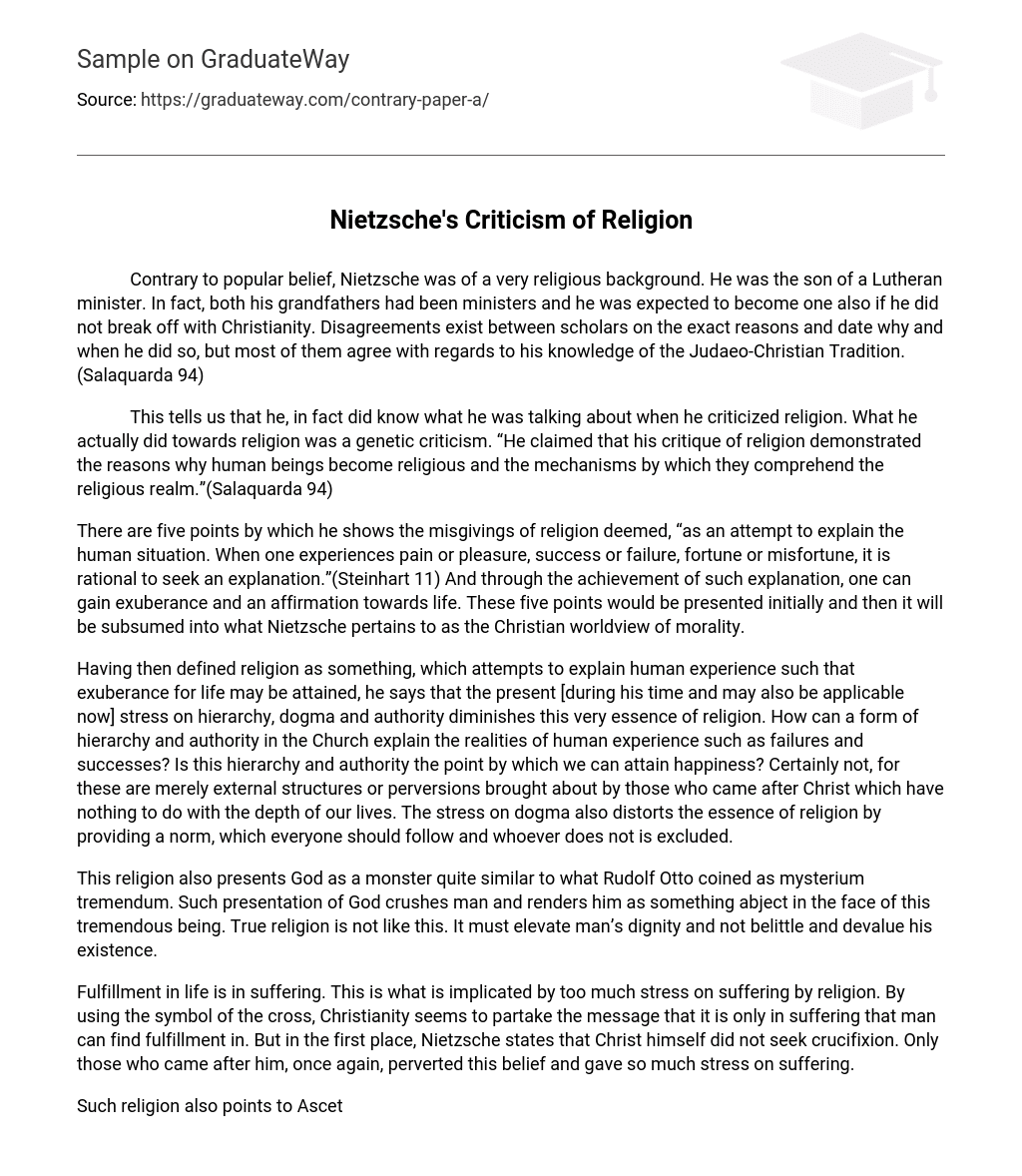Contrary to popular belief, Nietzsche was of a very religious background. He was the son of a Lutheran minister. In fact, both his grandfathers had been ministers and he was expected to become one also if he did not break off with Christianity. Disagreements exist between scholars on the exact reasons and date why and when he did so, but most of them agree with regards to his knowledge of the Judaeo-Christian Tradition. (Salaquarda 94)
This tells us that he, in fact did know what he was talking about when he criticized religion. What he actually did towards religion was a genetic criticism. “He claimed that his critique of religion demonstrated the reasons why human beings become religious and the mechanisms by which they comprehend the religious realm.”(Salaquarda 94)
There are five points by which he shows the misgivings of religion deemed, “as an attempt to explain the human situation. When one experiences pain or pleasure, success or failure, fortune or misfortune, it is rational to seek an explanation.”(Steinhart 11) And through the achievement of such explanation, one can gain exuberance and an affirmation towards life. These five points would be presented initially and then it will be subsumed into what Nietzsche pertains to as the Christian worldview of morality.
Having then defined religion as something, which attempts to explain human experience such that exuberance for life may be attained, he says that the present [during his time and may also be applicable now] stress on hierarchy, dogma and authority diminishes this very essence of religion. How can a form of hierarchy and authority in the Church explain the realities of human experience such as failures and successes? Is this hierarchy and authority the point by which we can attain happiness? Certainly not, for these are merely external structures or perversions brought about by those who came after Christ which have nothing to do with the depth of our lives. The stress on dogma also distorts the essence of religion by providing a norm, which everyone should follow and whoever does not is excluded.
This religion also presents God as a monster quite similar to what Rudolf Otto coined as mysterium tremendum. Such presentation of God crushes man and renders him as something abject in the face of this tremendous being. True religion is not like this. It must elevate man’s dignity and not belittle and devalue his existence.
Fulfillment in life is in suffering. This is what is implicated by too much stress on suffering by religion. By using the symbol of the cross, Christianity seems to partake the message that it is only in suffering that man can find fulfillment in. But in the first place, Nietzsche states that Christ himself did not seek crucifixion. Only those who came after him, once again, perverted this belief and gave so much stress on suffering.
Such religion also points to Asceticism and Eschatology. “Asceticism is the love of the supernatural world plus the hatred of the natural world…adds that all value exists in the other world; so that the natural world has no value; it is worthless.” (Steinhart 14) Eschatology is quite similar to that. It stresses so much on the after life that the here and now is devalued. If fulfillment is to come from religion, it is then giving its believers a compensatory fulfillment such that after all the suffering and pain here there would be peace and tranquility in the after life.
The fifth point of his critique is his most famous statement, “God is dead.” This statement appeared twice in The Gay Science. It appears first in Section 108, which opens Book Three
His most famous statement understood in the context of Europe that time would point to a very sad reality that people live as if God did not exist; that he no longer makes any difference on people’s life. In connection to the previous quote from Gay science, “There is also the danger that science will be treated as the new religion, serving as basis for retaining the same damaging psychological habit that the Christian religion has developed.” (The Cambridge Companion to Nietzsche 36)
Nietzsche argues that the concepts that Christianity uses to analyze moral experience – especially sin and afterlife – are entirely imaginary and psychologically pernicious. These categories deprecate human experience making its significance appear much more vile than it actually is. Painting reality in a morbid light
Works Cited
Salaquarda, Jorg. “Nietzsche and the Judaeo-Christian Tradition” The Cambridge Companion to Nietzsche. New York: Cambridge University Press, 1996.
Steinhart, Eric. On Nietzsche. California: Wadsworth/Thomson Learning, 2000.





